#been doing too many grimdark politics posts
Explore tagged Tumblr posts
Text
This one goes out to
transfems named Alice, Jessica, Lily, or Emily
transmascs named Kai, Noah, Tyler, or Elliot
any trans person named Alex, Sam, Aiden, Charlie, Riley or
any trans person who ended up with a common trans name, knowingly or not.
You're valid and clearly have amazing taste: These names are popular for a reason! Your name isn't like a username! They don't have to all be unique! You don't have to pick the specialest name and set yourself apart from every other trans person to be valid!!
All that matters is that the name feels right for you.
You've chosen perfectly. Keep it up!
#ramble#trans#transgender#queer#lgbtq#crimes against the gender convention#trans positivity#trans names#im one of the above#felt a bit insecure about it at first#also because almost all of these have some sort of pop culture counterpart#and if anyone ever asks if i named myself after the supernatural guy i will have no choice but to detransition#pissing on the poor clarification: theres nothing wrong with having the most specialest name either. call yourself ebony dementia dark rave#as long as it makes you happy thats all that matters#been doing too many grimdark politics posts#we gotta have some happy stuff in here too#maybe i should go reblog a few cats
42 notes
·
View notes
Text
Yuta, Gojo, Geto, and does the end justify the means?
[spoilers up until JJK 269]
I've seen a post floating around about what the point of Yuta overtaking Gojo's body was, and since I haven't seen many people interpret it the way I have, I wanted to take a minute to talk about it.
First of all, I do think Gege had several reasons to do it, one of them being to give the answer to the "are you Gojo Satoru because you're the strongest or are you the strongest because you're Gojo Satoru". However, while many people tend to center that idea, it's only one aspect of it for me.
I'm also of the mind that part of it was telling the fans that nah, he really really wasn't coming back (don't necessarily assign malice to it, but yeah I think it was part of the point). That being said, there is an argument to be made that it was foreshadowed in chapter 90 by Kenjaku, so I don't think that was solely the point and Gege might have had this planned for a lot longer.
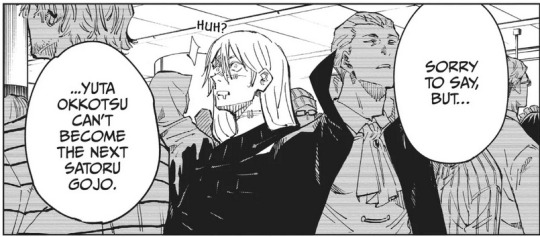
However, for me, it's not so much about the battle or about the plot, but rather about the themes it sets in place for the story, and these themes have been present for a while in Jujutsu Kaisen.
At the heart of it is, essentially, "does the end justify the means?"
That's a big theme in the manga as a whole, I'd argue. It's at the heart of the Geto thing ("does saving the lives of sorcerers justify killing every single non-sorcerer") in particular. It's behind most of the higher-ups' actions, though their 'ends' don't appear to be altruistic. It's also a question Gojo usually refuses to answer, or tentatively says "no" to — in refusing to kill Yuuji, Yuta, in protecting Hakari, and probably plenty of people before them. He does end up playing in that game, though, when he kills the higher-ups — deciding that the end might justify the means, a gamble he hadn't always thought worth taking until then. [This is my read on Gojo, but it's open to interpretation]
(I can't be brief to save my life so I'm putting the rest of this Very Long Post under the cut)
We see this not so much with the fight, but mostly in the conversations we see Yuta having in chapter 261, before taking Gojo's body. That's the whole point of the debate they're all having. Yuta is arguing that you have to do whatever to win against Sukuna,
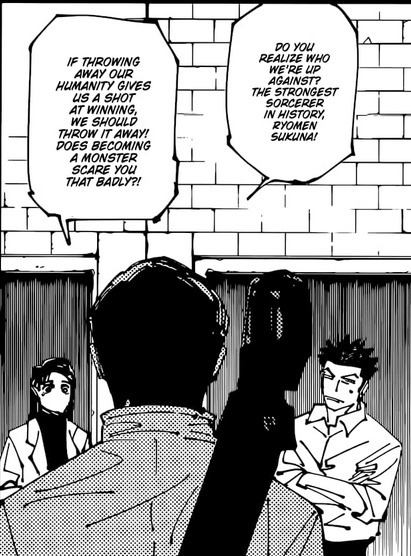
while others, Kusakabe and Maki in particular, have their reservations. [Which is interesting considering Kusakabe does think that killing Yuuji to kill Sukuna was warranted, shows that values are complicated things]
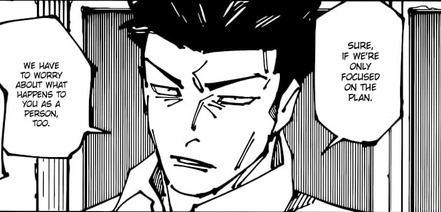
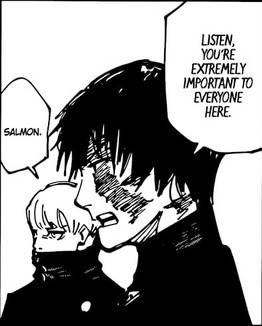
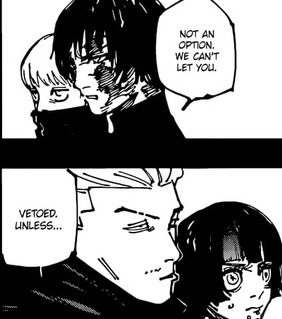
Yuta's whole speech is about, really, the fact that you have to do whatever you can do, no matter what that is, to win. No matter whether or not you destroy yourself as a person, no matter how heinous it is, if it gets a win, it needs to be done.
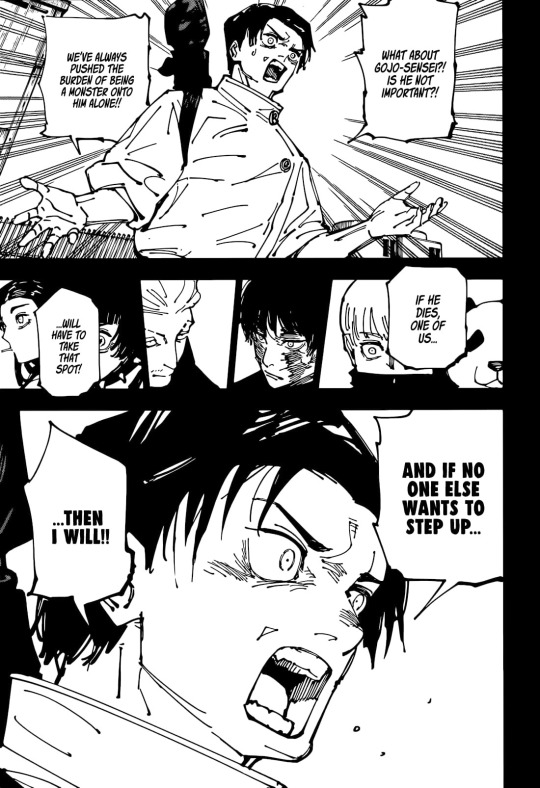
There's something a little self-sacrificial, self-martyrdom, lowkey suicidal about it too imo but that's besides the point (not necessarily a criticism of Yuta btw, think it makes him more interesting and gives him a lot of depth).
Anyway, back to the point: Yuta is emphatically saying, yes, the end justifies the means. That was also what the fandom was saying when the chapter was coming out, actually. I saw a lot of the argument that it was 'not realistic' for them not to do that, and that 'this was a war and yes, it's horrible, but war is horrible', etc, etc.
Now at that point, I was seething in my small corner of the Internet because from the moment that conversation was had, I needed Yuta to lose, because I fucking hated the message it would give if he won. This is, admittedly, a deeply subjective thing — it's a personal and political opinion, and everyone's going to have their own, but as far as I'm concerned, it would have been awful. At that point I was still really worried that the story was going to go full grimdark and I would have hated it if the last message we got was that renouncing all your values is justified in war if it gets you a win.
Anyway, we all know this by now, but that's not what happened.
Geto, who ended up renouncing even his own values by attacking sorcerers in the name of building his perfect world, loses to the love that Yuta has for Maki and Rika in particular, two non-sorcerers.
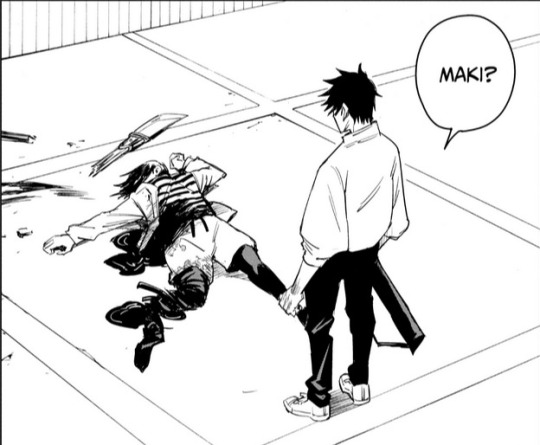
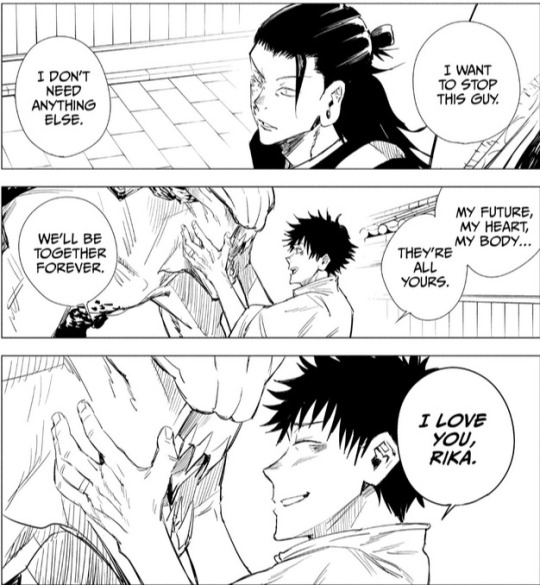
And Sukuna loses, not to a Kamo, a Zen'in or a Gojo, not even to the descendant of the big three vengeful spirits, all of whom have sacrificed so much of their values to get to the level of power they have, but to a no-name kid who doesn't even have a cursed technique armed with the power of love and friendship. (Not mocking this btw, thrilled about it) Just as importantly, Yuuji has done the very opposite of abandoning his values: he's fought to keep them until the very end. Even at the very end, he offers Sukuna a hand, because his main value is not to kill people, unless absolutely necessary.

Meanwhile, Yuta going into Gojo's body gets him nothing. He's committed the abominable, and it's not a decisive move against Sukuna. He's gone against some very general human values — anyone can see why what he's done is fucked up (and I can't pinpoint it precisely but I'd argue that there's a parallel between that and him cursing Rika) — and it gets him nothing. Even if it had gotten him somewhere, there was another way. A way that didn't involve that.
So that, to me, is the point of Yuta taking over Gojo's body: no, you can't just do anything to win a battle, and yes, you can refuse to do certain sacrifices and succeed. Don't abandon the things you hold dear. You can lose, but you can also still prevail, Jujutsu Kaisen says in the end.
Now for the more critical part of this broadcast, while I do think this aspect is why Gege chose to have that happen, I 100% find that chapter 269 and the complete lack of consequences the action ends up carrying really really cheapens it. Everyone was up in arms about it at first, and then Yuta comes back and we act like nothing's happened? I mean it's a theme of the chapter for sure, acting like nothing's happened that is, but it still sucks.
I think that's partly why Maki is mad at Yuta in chapter 269, considering she was the one who was most strongly against the idea, but it's not brought up explicitly. It's completely incomprehensible to me that Gege thought the chapter would be better used talking about how they could have acted differently and that whole New Shadow Style school thing than dealing with the consequences of the characters' actions that he'd prepared earlier, but whatever.
So in the end, while it was an interesting point to bring to the story, it was not used to its full potential. In a story that's all about breaking cycles, it's a shame that there wasn't more light shed on how people kept repeating the same mistake.
#jujutsu kaisen#jjk#very long post#long post#jujutsu kaisen spoilers#jjk spoilers#jjk manga spoilers#jjk leaks#jjk critical#again let me know if this is too critical for the main tag i'm not clear on this fandom's etiquette#gojo satoru
56 notes
·
View notes
Note
I don't know what hopepunk is and at this point I'm too afraid to ask
well anon, part of your problem here is that hopepunk is in a lot of ways a meaningless descriptor that means whatever people want it to mean.
took a bit of digging but I found the post that broke down a lot of my issues with hopepunk as a concept/subgenre, here; to quote from that:
You may notice that the philosophy is incoherent, mainly boiling down to “the things I like are hopepunk and the things I don’t like aren’t.” It builds a philosophy out of opposition to a strawman of “grimdark” that doesn’t really exist. So hopepunk means you keep fighting for what you believe in regardless of what that is, and violence isn’t the answer, except when it is. Hopepunk is about being kind and soft but also about punching the bad guy with the gun. Hopepunk is a morass of FEELING REALLY STRONGLY ABOUT THINGS!!! without a fundamental core of… anything concrete.
[...]
Hopepunk in practice is unbearably twee. The goal is to be to inspire a feeling of hope in the reader, which means that nothing bad is allowed to really happen, characters aren’t ever allowed to mess up or be mean or have flaws, and any mistake is well-intentioned and quickly & easily resolved by talking about your feelings.
and I could just leave it at that because, like I said, pretty good summation of my perspective, but sometimes an ask hits me at the exact right time for me to go off about something that consistently irritates me but I usually keep my mouth shut about for one reason or another.
and I feel like the first thing I want to say is. look. it's not like I'm out here going "hope is for losers and all I ever want is tragic stories where everything is awful forever." but the thing about hopepunk, at least in the ways I see it described, is that, in its dedication to be "the opposite of grimdark," shies away from representing darkness at all, except maybe in the most cursory, glancing ways. there's nothing to confront, nothing to push back against. villains are easily identified and unproblematically evil. protagonists are unimpeachably nice and good, and always have perfect politics. moral complexity is to be avoided, because raising too many questions might interrupt the positive feelings the author hopes to evoke.
not only does this create, in my opinion, really dull stories about very uninteresting characters, it also blunts anything the book is trying to say. if you don't want to confront any kind of conflict or struggle in depth then you've kneecapped your ability to talk about the full range of human experience. if the only antagonist you allow is a hollow caricature, then there's only so much room your protagonists have to express strength in opposing them.
the whole framework results in a kind of tepid, anodyne storytelling that expresses meaningless platitudes that the audience is presumed to agree with, often with a side helping of didacticism and "teachable moments." it's weak storytelling.
there's a world in which "hopepunk" is referring to a kind of story that I actually really like; for instance, there's a world in which one could call Malazan: Book of the Fallen "hopepunk." I am tempted to do that, just because I think it would drive people nuts. I think hopepunk wants to be doing something like the line from The Silmarillion that opens the tale of Beren and Luthien: "Among the tales of sorrow and of ruin that come down to us from the darkness of those days there are yet some in which amid weeping there is joy and under the shadow of death light that endures."
but out of a fear of representing anything actually ugly, or possibly making people feel kinda bad about something, or challenging the reader in any way, everything that might have been interesting gets stripped out and what's left is literature that feels like cotton candy: maybe it's sweet, but there's nothing to bite into, and nothing that lingers.
#conversating#anonymous#lise's aggressively bitchy opinions about irrelevant and unimportant matters#lise has opinions#sometimes i read things#hoo boy i think that's been stewing in me for a while
199 notes
·
View notes
Text
Recent Media Consumed
Books
Half-Bad by Sally Green. Man, this is grim. It’s good fantasy, and the writers breaks certain writing conventions to convey the story better, which is fascinating. But it’s so grim. There’s two more books in the series and I want to get ahold of those before I say more.
Zoo City by Lauren Beukes. Did I say Half-Bad was grim? This is grim. Grimdark to the max. But also a fascinating premise, that the crime of murder and its accompanying guilt manifests an animal companion that marks you for the rest of your (shortened) life? If you can stomach some of the imagery and if you do well with being plunged into unknown terminology and figuring it out on the go from context, this is a good read.
Dropped titles: Pursuing God’s Will Together by Ruth Haley Barton and How Should We Then Live by Francis Shaeffer. One was a recommendation, one was semi-assigned reading because I’m a non-voting member of a ministry board. In both cases I got about halfway through. I have the gist of both books and I’m enjoying neither. At all. I started to avoid Audible altogether. The moment I gave myself permission to stop listening to them and pick up the next Thomas Sowell book on my list, I was right back on reading, because I’m actually interested in what Sowell has to say. Note to self: it’s ok to drop books that you find uninteresting. (this preceded a Sowell binge reading session)
Dismantling America (and other controversial essays) by Thomas Sowell. I was surprised at how much more of an edge Sowell has in this book, but the appearance of the edge here makes a certain amount of sense. This is the first collection of newspaper columns I’ve read by him, and he has way less time to make his point in a column than he has in a book. With that in mind, his points have much less groundwork than I’m used to reading from him when he spends a whole book on a topic (though I’d guess that each point he makes probably has a crapton of citations in the printed book, like the rest of his work. He’s quite thorough about his research). This is probably not the best title of his to pick as a first read, but it’s good and interesting. My main take-away point from this book is that politicians look out for politicians, and expecting them to do anything else is naive. And, in fact, many things attributed to a politician’s “stupidity” is far from stupid, in fact they are brilliant within their set of incentives and constraints. It just rarely aligns with the general public’s best interest. Thinking about it again, it MIGHT be a good first book. It sums up a lot of his views into bite-sized digests. It just doesn’t substantiate each and every claim as thoroughly as some of his other books do. That’s my grain of salt.
Compassion Versus Guilt by Thomas Sowell. More of the same, a collection of essays by Sowell. Different ones, on a different theme. A couple that sound like they could have been written by the authors of Politically Correct Bedtime Stories, his satire is on point.
Ethnic America by Thomas Sowell. This was a fascinating read for me. This book traces 8 groups of ethnic migrations to America. I descend from Scottish, Irish, and Russian Jewish immigrants, and seeing what the different groups had to content with over the years was very enlightening. A few things that stood out to me were; each immigrant group seems to have very different cultural strengths and foibles, inter-group violence is not new (but not always in the directions modern people would think), almost every group has its own upper class that disdains and reviles its lower class, and each ethnic group is far more variable and differentiated than the general category (“the Irish” or “the blacks” or “the Jews”) makes them out to be. More and more I’m coming to mistrust the general racial category as referenced by either political party because it seems to be a linguistic expediency that sacrifices the truth of a situation for a fast rallying point.
Civil Rights: Rhetoric or Reality? by Thomas Sowell. I’m not even sure what to say about this book. It’s short and punchy and gives me a lot to think about. Sowell definitely has zero sacred cows. Toward the end of this book he addresses some of his critics who piled onto Ethnic America, which was interesting. Also, while reading this, I have begun to realize how much of a disadvantage I am at in analyzing arguments because I’m unable to understand how people slice numbers into statistics to make their point. I’m at the mercy of the conclusion they draw at the end of the statistics because, until they summarize their findings, I really don’t understand what the raw numbers are saying. I’ve had this feeling for a while, but in this book, Sowell dissects some of the foundational studies and statistics that buttressed later civil rights cases, and I realized that if I just read the statistics and data from those cases and the statistical rebuttals that Sowell has side by side, I would not understand what was being argued at all. I can only rely on the end conclusions put into words at this point, but the written conclusion is not the proof, the numbers are. This gap in my understanding is disheartening, but I hope to continue sponging up knowledge in the hopes that I will be able to think more critically in future years.
Maverick, a Biography of Thomas Sowell by Jason L. Riley. My parents pre-ordered this for my birthday a few months ago and it arrived a few days ago. I have torn through it. I think I got a more cohesive overview of Sowell’s progression through his body of work and added several titles to my wishlist. The biography is fairly minimalist on Sowell’s personal life and focuses more on his ideological clashes with… well, everyone, left and right, people he disdained and people he admired. Maverick, alright. Also Riley takes a look at how each of Sowell’s books (or grouping of books) came about, for what reasons, and what was going on at the time.
People of the Book edited by Rachel Swirsky and Sean Wallace. This is a compilation of Jewish sci-fi and fantasy short stories and can probably be summed up best by this paragraph in the introduction: “These stories allow us to identify with, although briefly, so many different characters and places, they entertain us and they give us comfort. And yet, the tales in this anthology often have a melancholic tinge, similar in tone to the minor keys of our musical liturgy. We don’t want to be too comfortable, too happy. Because that might bring some bad luck onto us, might tempt the evil eye.” I also sensed a whole lot of anger in the undercurrent of these stories, and that saddened me.
On deck/currently reading: The Brothers Karamazov, The Rational Bible: Genesis, re-read of Basic Economics, and War Nerd.
Shows
Dropped series: Hilda. The first season was lovely on so many counts. The second season’s antagonist… bothers me. So does Hilda’s behavior. And given how much time I spent on Star and its accompanying disappointment, I’m not really interested in continuing Hilda any further. I’m shelving it at this point. There are other things I’d like to watch.
Infinity Train Season 4: Now retitled “The Wormhole Judgment Line” I believe, lol. It’s hard to top season 3, but it was a solid story. Good. Interesting. The resolution with the villains int he last episode felt kind of out of nowhere and I’m really not okay with Morgan’s behavior even if the plot wants me to feel sorry for her, but those things aside, it was enjoyable. I hope Infinity Train is picked up again, I’d love to see more.
On Deck: The Mandalorian or Wandavision
Movies
Jiang Ziya. Okay whatever this studio produces in this line of movies, I will be watching it. I definitely don’t understand all the significance of what I’m seeing but it’s creative along COMPLETELY DIFFERENT lines than US animation and it’s an absolute joy to behold.
Raya and the Last Dragon. Suffice it to say, it would take an intensive blog post (or a movie review of the style I used to do as one half of The Storytrollers) to cover all the things that bothered me about this movie. I will take the thing that bothered me the most and be brief: I find the moral to be terrible. I take major issue with the idea that repeated blind trust in the face of repeated betrayal will reshape the world, given that I extended blind trust to people who never changed for many years. I take issue with the worldbuilding, I take issue with some of the designs, and I take issue with the moral. I was exceedingly disappointed in this movie.
Profile. Now THIS was a good movie. I would not be averse to seeing more movies shot like this, using the computer desktop as both film set and character. In addition this was an interesting topic, though I was tense for the whole movie, afraid the main character was going to slip up. Very good, very tense movie to sit through.
Mighty Ira. So, this is a documentary about one of the great leaders of the ACLU. It was interesting to see this, especially since it shed more light on the whole Skokie situation than I’d heard of before. Good watch. Informative.
#child loves movies#child loves shows#child loves books#recent media consumed#mind your peas and queues
6 notes
·
View notes
Text
Are You Afraid of the Darkness?: A Hopepunk Explainer
https://ift.tt/2PUZUv7
A brief guide to the hopepunk movement—its origins, and its possibilities.
facebook
twitter
tumblr
This feature originally appeared in Den of Geek's NYCC 2019 print magazine.
When author Alexandra Rowland (A Choir of Lies) first posted to Tumblr in 2017, "The opposite of grimdark is hopepunk. Pass it on," she had no idea how intensely that sentiment would resonate with the platform’s community and beyond.
"Initially, I was just vaguely bemused that anyone was listening to me," Rowland says, "but at the same time, I understood intellectually why hopepunk was resonating with people. Simply put: they were hurting, and hopepunk was a thing that helped comfort the hurt."
What is hopepunk? It depends on who you ask...
Rowland, quoting her essay “One Atom of Justice, One Molecule of Mercy, and the Empire of Unsheathed Knives,” says: “Hopepunk is a subgenre and a philosophy that ‘says kindness and softness don’t equal weakness, and that, in this world of brutal cynicism and nihilism, being kind is a political act. An act of rebellion.’”
To understand hopepunk as a concept it helps to understand what it stands in contrast to. Grimdark is a fantasy subgenre characterized by bleak settings in which humanity is fundamentally cutthroat, and where no individual or community can stop the world’s inevitable decline. Hopepunk, in contrast, believes that the very act of trying has meaning, that fighting for positive change in and of itself has worth—especially if we do it together.
read more: Autuonomous — Robots, Love, and Identity Under Capitalism
“I think it's a reaction against the overwhelmingly nihilistic, dystopian slant to a lot of stories in the world right now,” says author Annalee Newitz (The Future of Another Timeline). For Newitz, hopepunk isn’t a subgenre but rather “a reason to tell stories, a motivation, or maybe a narrative tone.”
“The idea is to tell a story where there are hopeful elements or maybe a hopeful resolution to the characters' struggles,” Newitz says. “I don't mean to suggest it’s all about having a happy ending, because you can have a pretty ambivalent, broody ending that still conveys hope. Hopepunk is really about showing readers that we can make it through even the most difficult situations. Even if your hero dies, hopepunk suggests that someone else will be there to take up her torch and carry on.”
Hopepunk is Curtis blowing up the train at the end of Snowpiercer, or Max and Furiosa deciding to risk everything and go back to the Citadel at the end of Mad Max: Fury Road. It’s Naomi choosing to open the Roci’s door to let in as many desperate Ganymede refugees as possible in The Expanse. It’s believing that humanity may not be inherently good, but we’re not inherently bad either, and that giving people the chance to prove themselves compassionate is a worthwhile choice.
“At Uncanny, we tend to think of this as ‘radical empathy’ or ‘radical kindness’—choosing to do the good, kind thing, even when the system doesn’t encourage that, as an act of courage,” say Lynne M. Thomas and Michael Damien Thomas, the editors of Uncanny Magazine.
read more: City in the Middle of the Night Review
The Thomases contextualize “hopepunk” as a marketing term, one that has gained prominence in the last few years but that has been around much longer: “There have been veins of hope (as opposed to grimdark hopelessness) across literature for hundreds of years, and for decades within the SFF genre.”
If hopepunk, by some definitions, is nothing new, it is a cultural lens seemingly on the rise after a pop culture period ruled by cynical stories, like Breaking Bad and The Dark Knight, and in a real-world environment that has become increasingly distressing.
“We can retreat into paralysis, and pretend that's somehow pragmatic or realistic,” says Newitz. “Or we can say, fine, this is a horrible problem, let's get together with other people and try to solve any small part of it that we can. Those are the two pathways we can take through a narrative, too. We can tell stories about people who try to fix things, rather than rejoicing in their splendid destruction. It’s a way of showing other people that just because things aren’t perfect, doesn’t mean they can’t be better.”
Has the definition of hopepunk changed since Rowland first coined the term?
“The heart of [my original definition] hasn't changed at all, but my efforts to remind people of the angry part of hopepunk definitely have grown,” she says. “The instinct is to make it only about softness and kindness, because those are what we’re most hungry for. We all want to be treated gently. But sometimes the kindest thing you can do for someone is to stand up to a bully on their behalf, and that takes guts and rage.”
read more: How Red, White, and Royal Blue Hopes For a Kinder America
In 2019, hope can feel impossible. If the past few years have taught us anything, it’s that the struggle to create a kinder and more just world is one that will never be linear and will never be over. It is bigger than any one of us, and longer than any lifetime. If hopepunk is the stories that keep us trying in the long shadow of that reality, then it is a vital ingredient to the recipe for change.
So what is hopepunk storytelling? It’s whatever you need it to be... as long as what you need it to be is a way forward in the darkness.
“In hindsight,” Rowland says, “I'm just very happy–when so many people find a philosophy like hopepunk meaningful and compelling... it sorta restores a bit of your faith in humanity, doesn’t it? Maybe all is not yet lost if there are enough people around to say, ‘Oh. Yes, this.’”
Hopepunk Reading Guide
Novels
The Goblin Emperor by Katherine Addison Saga by Brian K. Vaughan and Fiona Staples Uprooted by Naomi Novik Parable of the Sower by Octavia Butler The Future of Another Timeline by Annalee Newitz The Calculating Stars by Mary Robinette Kowal A Choir of Lies by Alexandra Rowland The City in the Middle of the Night by Charlie Jane Anders Trail of Lightning by Rebecca Roanhorse The Expanse by James S.A. Corey Wayward Son by Rainbow Rowell The Sol Majestic by Ferrett Steinmetz The Book of the Unnamed Midwife by Meg Elison
Other
Our Opinions Are Correct Podcast, Episode 22 hosted by Annalee Newitz and Charlie Jane Anders
Uncanny Magazine edited by Lynne M. Thomas and Michael Damien Thomas (recommendations: "Contingency Plans for the Apocalypse" by S.B. Divya, "Sun, Moon, Dust," by Ursula Vernon, and "Packing" by T. Kingfisher)
Hopepunk Author Interviews
Due to the nature of print media, I was unable to include as many of my interviewees' insightful thoughts on hopepunk as I would have liked to. Here is a guide to the full interviews from various speculative fiction authors and editors. I highly recommend clicking through to read them in their entirety.
An Interview with Alexandra Rowland, Author of A Choir of Lies
Excerpt: "By telling hopepunk stories, we necessarily have to be asking questions like, 'How do we care about each other in a world which so aggressively doesn't care about so many of the people in our communities? Who do we consider community, and is that definition too narrow? How do we fight back against the people who want to make us sit down and shut up?'"
An Interview with Annalee Newitz, Author of The Future of Another Timeline
Excerpt: "I think hopepunk is the opposite of apathy. In so many stories these days, characters are (literally or metaphorically) lighting cigarettes and enjoying the end of the world. They may look cool doing it, but it's profoundly anti-social and toxic. As soon as your characters don't give a shit about anything, you're leaving hopepunk behind."
An Interview with Lynne M. Thomas & Michael Damien Thomas, Editors of Uncanny Magazine
Excerpt: "We think that the world can always use more radical empathy and radical kindness. Culture is, fundamentally, a mix of people giving in to their most kind and least kind impulses, and much of our storytelling comes from that inherent conflict. We'd rather encourage the former, personally."
An Interview with Ferrett Steinmetz, Author of The Sol Majestic
Excerpt: "I loved it the moment I heard it. I'm an old punk who knocked around some of the Nazis that the Dead Kennedys decried in 'Nazi Punks F**k Off,' so the idea of punk utilized for something other than some Hot Topic-style cynicism flooded me with joy."
Note: The title of this article comes from hopepunk musician Frank Turner's "Blackout."
Kayti Burt is a staff editor covering books, TV, movies, and fan culture at Den of Geek. Read more of her work here or follow her on Twitter @kaytiburt.
Read and download the Den of Geek NYCC 2019 Special Edition Magazine right here!
facebook
twitter
tumblr
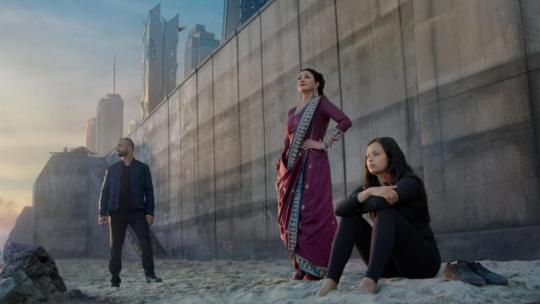
Feature
Culture
Kayti Burt
Nov 7, 2019
Hopepunk
NYCC
NYCC 2019
from Books https://ift.tt/32pEbOv
0 notes
Note
A,E,F,G,I,J,K,L,M,N,O,P,Q,R,S,T,U,V,W,X,Y,Z ;o
Okay *cracks knuckles* let’s go! F, M, and S have already been taken from this list, so feel free to send in... B, C, D, or H, I guess. Yeehaw. This is really fucking long.
A: How did you come up with the title to [TMWCIFTC]? -- It started, as many things do, as a bad pun. The novel The Spy who Came In from the Cold was a cold-war spy thriller, about a British spy who goes over to East Germany as an apparent defect, except he’s actually there to spread misinformation and fuck shit up. He falls in love, becomes disillusioned with his superiors, and is shot dead over the corpse of his lover after climbing over to the east side of the wall. Needless to say, this is nowhere close to what happens in TMWCIFTC. I chose it early on because of the literal meaning: there’s a moth(man), he’s coming in from the cold WV weather, boom shaka laka, we have a title. Over time, though, it’s evolved into another meaning. Indrid himself is coming in from an isolated, lonely existence: he’s rejoining the family that cut ties with him, he’s in love, he’s warm and safe. The moth sure did come in from the cold, and hopefully he stays that way.
E: If you wrote a sequel to [TMWCIFTC], what would it be about? -- Hm. Considering my entire TAZ fic career is a tangled hairball of sequels and prequels, I kind of have this base covered. At the moment, TCOS - aka The Children of Sylvain, the sequel to TMWCIFTC - is about three things: a Pine Guard road trip race against time and the feds, the Spanish Sylvan Inquisition That Nobody Expected (least of all Jake and Hollis, who have to set aside their differences and past conflicts to save Kepler - and who knows, maybe they’ll fall in love along the way), and Alexandra the Interpreter getting woke to Sylvan politics and doing what she can from the inside to change them. In other words, it’s going to be a massive sequel that is the finale of the Amnesty alternate universe I’ve created. It’s this series’ Endgame. (That reminds me, I need an actual title for this collection of stories I’m writing. The “Tin Cinematic Universe” doesn’t quite have the ring to it that I’d like.)
G: Do you write your story from start to finish, or do you write the scenes out of order? -- eh, it kind of depends. It’s like a buffering bar on Youtube videos. I outline what I can until I run out of ideas, then start writing, then add outlines to the end, until the outline is complete and I just have to keep writing.
I: Do you have a guilty pleasure in fic (reading or writing)? -- I don’t have one for reading, but for writing, I fucking love structuring chapters around songs. Classical or otherwise, I love music. All my stories play in my head like a movie screen, and I just do my best to describe what I’m seeing in my head with an accompanying score. It’s not so much a guilty pleasure as it is a writing process. Frankly, I don’t think I actually have a guilty pleasure; the act of writing itself is all the happiness I need.
J: Write or describe an alternative ending to [insert fic]. -- An alternate ending for The Devil Went Down To Georgia would be... interesting. It ended with Boyd-as-Jersey-Devil scaring the pants off some poor broke college kid, who stole his worthless fiddle; then he changed back, and he and Ned went on their merry way to go break into Aubrey’s house and send everything down the drain. If there was one thing that I could change in there, it would be how fast Ned ran. If he ran a little faster, he would have seen the alley; he would have witnessed Boyd turning into the Jersey Devil, or at least turning back into himself; and he’d get a very rude awakening as to what Sylvans are and that his partner (in crime, and everything that mattered) was a fucking cryptid. God, that’d be a fun AU to write. Who knows, I might go do that someday.
K: What’s the angstiest idea you’ve ever come up with? -- At the moment, the only angsty idea that I’m actually conceptualizing is a Hollis/Jake angsty breakup for TSG. (Spoilers, I guess.) I once wrote a very grimdark ending to TMWCIFTC where everyone fell through the ice and drowned. It wasn’t fun. I’ve also mentally killed off each Amnesty protagonist and NPC in various ways, but I never felt comfortable writing them down. I only write angst with a happy ending because those are the kinds of stories I need to hear.
L: How many times do you usually revise your fic/chapter before posting? -- 9 times out of 10, I just throw it into the void. I write as much as I can in big chunks, and then kind of hope for the best. TMWCIFTC, for example, is a completely unedited, unbetaed vomit draft. I usually do a quick reread of my oneshots to catch grammar and spelling errors, but other than that I just trust myself that it’s fine.
N: Is there a fic you wish someone else would write (or finish) for you? -- Can I get some kind of resolution for To the Edge of Night? Can I please get some kind of resolution for To the Edge of Night??? I was 14 chapters into that bastard before I a) became a more casual MCU fan and b) discovered TAZ. It was such a niche fic with such a niche structure - LOTR as galactic Asgardian propaganda to cover up Odin’s mistakes - that at some point I lost interest in it. I just saw Endgame though, so now I might get some inspiration for stuff to bastardize.
O: How do you begin a story–with the plot, or the characters? -- Characters. When coming up with character backstories, I can usually find ways to slot their lives together that necessitate a plot. I love character-driven stories, where their actions actually do shit and their words actually mean something, in favor of getting dragged along behind the plot like tin cans behind a car.
P: Are you what George R. R. Martin would call an “architect” or a “gardener”? (How much do you plan in advance, versus letting the story unfold as you go?) -- I’m definitely an architect, but in a really messy way. My friends can attest that I do an insane amount of planning for each story - often in their DMs, sorry about that, Fae, Cro, Indy and Aline 😬 - and all that usually ends up in a stream-of-consciousness rant outline on Google Drive. Knowing where the story is going helps me a lot, but the planning I do is definitely just building flower beds in which to sow seeds. Or building a greenhouse. I plan the bare bones of a story, and things get really wild within it, but it does follow a logical plot structure.
Q: How do you feel about collaborations? -- I have a lot of respect for the people who can successfully pull it off, but idk if i’d ever want to do one myself. I get really possessive of my stories and ideas and like to be the one in charge of their execution. That being said, some collabs have produced amazing stories. I don’t mind reading collab fics, but actually being in a collab grates on me more than it should.
R: Are there any writers (fanfic or otherwise) you consider an influence? -- I’m definitely influenced heavily by Neil Gaiman. I read American Gods and Good Omens a lot while I was trying to write TMWCIFTC; not only was it a good brain break, but I was able to pick up a lot of tips on scene pacing, concise yet expressive language, and character interactions. My creative wriitng professors have always told us to read so we know what to steal - not in terms of content, but in execution.
On the fanfic side, @miamaroo is a huge inspiration for me. I’ve been reading Northern Migration a lot recently, and I love how its canon divergence is so worldshaking and so complex, but is still familiar in nostalgic yet terrifying ways. I read it back in October, went, “Huh, I wanna do something that wild. And if miamaroo can do it then I sure as fuck can too,” and I started planning TMWCIFTC during that one month dead zone the McElroys took last year. Northern Migration is one of the best, most coherent, most stunning, and most incredibly written TAZ Balance AUs I’ve ever read, and if I hadn’t read it, I wouldn’t have been inspired to take the fuckall huge plunge into TMWCIFTC.
S: Any fandom tropes you can’t resist? -- Bed sharing and cuddling, hand kissing, wrist kissing, whump, sympathetic villains. Canon divergent AUs are my absolute favorite things to both read and write. Anything that would turn me into Charlie Kelly slamming his finger on a bulletin board screaming, “CAROL,” is a fic I would give my life for.
T: Any fandom tropes you can’t stand? -- Not a fan of a) woobification and b) flat villain characterization, to the point where the story is riding on villain tropes instead of an actual person or plot. Character nuance is always something I look for when I read. I don’t usually get bitter about tropes, though; some stuff, when subverted, works really well. I fully subscribe to don’t like, don’t read, don’t write, which is why I don’t write anything that warrants AO3 content warning tags or an Explicit rating, in favor of focusing on plot. Every author has a reason for what they write and how - be it their level of experience, personal preference, or simply the joy of writing something and getting it out there - and I respect that. Within reason, of course.
U: Share three of your favorite fic writers and why you like them so much. --
@miamaroo, for reasons I’ve already discussed. My favorite TAZ Balance author hands down. Read Northern Migration and give it the love it deserves, or I’m replacing all the faucets in your house with silly straws.
@transagentstern. Fae has a bunch of absolutely incredible fics and an amazing grasp on characterization. We come from the same place with AUs, in that canon is but the bare planks on which we put the drywall of our plot an characterization. They structure AUs and character backstories from the ground up in believable and emotionally raw ways. Also they have great music taste. I especially like their interpretation of Indrid in Moth to the Flame; he, like all the other characters in the story, is far from perfect, and his character arc is explored in relatable ways that I love to read.
@keplersheetz. Aline - theneonpineapple on AO3 - researches like a motherfucker and has a wealth of knowledge/experience/viewpoints to draw on, making author-author interactions with her an absolute delight. She’s also doing the lord’s work with rarepairs. Spin a wheel, find a ship, and she’s probably written for it or at least conceptualized it. Reading her character studies and stories of the old Pine Guard - aka Mama’s original crew, before the current PCs joined - is always a delight. I’ve also hashed out a lot of details for The Children of Sylvain, especially for Mr. Boyd Mosche, guilt-wracked Jersey Devil extraordinaire, with her help.
V: If you could write the sequel (or prequel) to any fic out there not written by yourself, which would you choose? -- Not gonna lie, I’m fine with a lot of stuff that’s out there right now. It’s been a hot few months since I’ve actually stopped to read fic, but from what I recall, most of the fics I’ve read have done a good job of keeping things intact.
W: Do you like more general prompts, or more specific ones? -- The vaguer, the better. With really specific prompts, it usually feels as if the story’s been written for me already; with vague, general prompts, I have more agency to explore my own ideas. Some accompanying detail is usually nice, though. For example, the coffee shop/college/flower shop AUs that @transagentstern wrote are my ideal prompt for drabbles: premise, a little bit of open-ended detail, clear explanation of what’s going to happen while leaving the rest up to the imagination. Good stuff. If it’s for a long-form piece, though, I prefer full agency, or even just some time to lie facedown in the dirt and wait for an idea to strike me.
X: A character you enjoy making suffer. -- Yes.
Y: A character you want to protect. -- Tim.
Z: Major character death–do you ever write/read it? Is there a character whose death you can’t tolerate? -- I do read lots of major character death, yeah, though not always for TAZ. There’s something cathartic about seeing a character die, but sometimes it sits wrong with me in ways that I don’t like. As for writing, I’d rather kill a character for a reason rather than for shock value/for the Feels, though said Feels can accompany the reason.
10 notes
·
View notes
Text
Earthborn Coalition - Humans That Are Pretty Chill
By far the most famous of human societies in the multiverse is the Imperial Commonwealth, who are doing their best to make everything bad forever. They have unintentionally given rise to a dissident faction that had split apart from their former territories and established a small but growing power base, with the stated intent of eventually retaking Earth from the horrific monsters that have rendered it uninhabitable.
This is the Earthborn Coalition; a group of world-states originaly part of the Commonwealth but having left them and declared total war upon their former masters for moral and practical reasons; moral, for they are a cruel and evil lot that must be stopped for the good of the multiverse, and practical because they are giving humans a bad name and making the job of survival harder.
The coalition is barely fifty years old, an infant in the scheme of things; during the Endowed Fleet’s earliest conflicts with the Commonwealth, some of the human-derived gods who were revered by the Fleet (such as Vulkan and his kin) were troubled by the state their people had fallen to, and sought to elevate. Through mortal incarnations, suitable clerics and paladins, and no small amount of intrigue and persuasion, they successfully reintroduced ideals from a more free and open time to the humans of the Commonwealth, and set off a civil war.
With help from the Fleet and other factions too eager to destroy the Commonwealth, many worlds split off and managed to hold onto independance, keeping their erstwhile allies at a distance in favor of self-rule. This has evolved into a loose-knit coalition, with shades of a federation. They have abandoned the xenophobia of their forefathers, but they are still very insular and isolationist. Not very interested in interstellar affairs, they prefer to tend to their own worlds and protect their own interests without bothering anyone else, or being bothered in return. Nevertheless, their interest in repopulating lost human colonies and reuniting what is left of their species means they have to come into contact with others; to this end, various mercenary companies have formed to do just that, exploring the multiverse and learning the skills to deal with the much larger denizens of the multiverse, mainly diplomatically.
Still conservative, the Coalition distrusts AI and robots in general (though granting them rights, should any choose to become citizens) and there are few aliens within their domain, though reasonably large populations of dwarves, elves and other human-derived species may exist there. They do not ban modding or cybernetics, but very heavily regulate it, and only the most mild mods are legal to acquire there. Fertility mods are the most heavily used, owing to the need to repopulate their species.
This does mean that they have a higher proportion of empowered individuals; already, enormously buxom women of gigantic size and power are rising to high office, though quite smaller than aliens and nonhumans of equal strength, and are minded to be high-tier paragons of virtue to live up to.
Culturally, they still tend to the style of the Commonwealth; they bear some similarity to space era evolutions of Victorian fashion, but are largely dominated by a synthesis of Imperial Japan and Roman Empire-like aesthetics, both in terms of architecture and fashion. Their people hail from all human ethnicities and nations from ancient times, but three Commonwealth lands began the uprising and were largely descended (genetically and culturally) from certain regions of Earth and thus the core of the Coalition is descended from those peoples: Central African, Japanese and North Asian, and Pacific indigenous civilizations. Individual worlds have developed new fashions and looks. Technologically, they have largely abandoned the obsessive love of the human body in favor of more practical designs and machinery; they prefer to use Earth-based artifacts, out of nostalgia, but they will use whatever is available.
Religiously, they are worshippers of the Primarch pantheon, the gods derived from humanity: Vulkan, Magnus the Red, Sanguinius, Corus Corax, Fulgrim, Jaghatai Khan, and the others. The God-Emperor is held most sacred but revered in an abstract, distant way. Notably,
The Coalition is intended to satisfy potential readers who may not be happy with my deep distrust and bordrline forthing hatred of humans just existing in speculative fiction, and I won’t make bones about it; I hate Humanity Fuck Yeah and the cultural imperialism implicit in current versions of Humans Are Space Orcs, and a lot of this setting has been specifically worded to make it inapplicable.
if you’ve gotten the impression that humans suck and are completely meaningless non-entities in this cosmology, well i was kind of going for that.
however i realize that’s not fair and is kind of mean-spirited, and so i’ve brought these guys in to fulfill a missing niche; that of humans and beings very similar to humans who are originally from Earth, oppose the Commonwealth, are capable of doing the cool modding and hyper transformation things other characters in this setting do, and aren’t explicitly written to be as horrible as possible.
They’re mainly a take on post-Earth sci fi societies from various fictions. They’ve got a bit of the militaristic vibe you see from a lot of those, with some hints of the Browncoats from Firefly (Despite my distaste for the subtext of the Browncoats), but they’re primarily intended to be a relatively moral and practical reworking of the Imperium of Man from Warhammer 40k. No grimdark here, and they’re a much smaller power, though growing fast; basically look at the more pragmatic and common sense interpretations of the Imperium’s best people, and you have the basic ideal of the Coalition. There’s a bit of Star Trek’s federation in there, though they haven’t QUITE hit that high point yet. they’re getting there.
If you want humans as characters, or to bring in characters who work best as humans or benefit the most from not being reimagined as non-humans (such as those whose identities are very firmly rooted in it, or if it would be whitewashing to make them nonhuman), the Coalition is a decent origin for them.
The idea is that they’re not exactly eager to be around others, due to their cultural baggage, so they’re isolationist. But they’re not hostile, so this is a decent origin for humans who have ‘not a fan of nonhumans, but not raging murderers’ as a thing: Zarya from Overwatch is a decent example, as are the less fanatical Imperial characters like Ciaphas Cain from 40k, or some of the more stand-offish Alliance members from Mass Effect.
a key point is that they are a small power, and they will STAY a minor power. they are not going to become an uber-powerful force of super sapients who will conquer everything forever with Human Spirit or something like that, because i HATE THAT. so damn much. the bulk of their power is based on economics and, well, weaponized nostalgia; they will be pretty important to people who value Earth, and they want to go back to their homeworld, so that’s good story hooks for them getting help to retake lost human worlds or trying to establish colonizing rights on those worlds that were once human but now have been claimed by others.
kink-wise, they’re intended to be more disinclined to it and tihnk it’s kind of weird/gross. its not illegal, at least within limits, but it’s not approved of. probably not a lot of vore-themed ability users, but a lot of hyper pregnant breeders. they’re bustier than the Commonwealth; men and women alike tend to be thicc meat tanks, and the use of careful modding is slowly making them larger and bulkier than real life humans. humanity 2.0, big and stronk.
they can come from pretty much any background or ethnicity, and their ancestors might come from any nation; i imagine that the ‘average’ Coalition citizen is probably from the broad demographics mentioned above, but this is hardly their entire population; name a region, and there are people descended from there in large amounts.
in the long term, they will probably remain an independant power with a cool indifference to the politics, not so much allies as trading partners to both Fleet and Stinger worlds. Most likely open to the Protheans and not the Decepticons or Yellow gems; they dont like talking to people who view humans as beneath them, even if its somewhat benign. They tend to be roughly honorable, and won’t have anything to do with the more outright evil factions, such as the Cartels.
#queued#crossthicc AU#twitchy ideas#hope u guys who might want more humies appreciate this#humans as a whole are NOT relevant to the setting and i would prefer to avoid ANYTHING that makes them seem like the default but#here these guys are if u want em
2 notes
·
View notes
Text
Scattered Star Wars novels thoughts: - I am almost finished with the Solo novelization, has anyone else read/finished it? It’s been doing a couple of weird things that I’m not sure if it’s meant to be picked up on or if they’re just there to be Something Cool and I’m reading too much into things. (I’m up to just past the Kessel Run/they just got to Savareen.) - I’m taking a break from the Aftermath series, because I finished Life Debt and enjoyed it a lot, but I wanted a bit of a palette cleanser before diving back in, so it doesn’t all blur together in a rush for me. Because I never really got a chance to let my feelings for a lot of the stuff that happened there breathe--so AFTERMATH SPOILERS for the entire book. It’s easy to focus on the bigger political stuff because I have more investment in Leia’s story, but I wanted to talk more about Rae, who did finally give me an answer about, “How can she be a good person and still be loyal to the Empire, knowing the terrible things they do?”

(Aftermath: Life Debt | by Chuck Wendig) “It may have been necessary for a time.” is basically her answer. And I’m not sure how I feel about it. Do I feel like it’s a bandaid on a meta level, that it’s a half-measure on the part of the writing of the book or a half-measure on Sloane’s behalf? I don’t have enough of reading her from other sources to be able to tell how well this fits with “this is the best justification the writing can do on this issue” VERSUS “yeah, Sloane’s kind of a terrible person”, I could better buy, “It was an ugly part of the perfect Empire in her head, not something she could do anything about right now, but it was always in her sights to make the Empire better than that.” and buy that she was a good person. Is that what I’m supposed to be taking away from this? Or am I supposed to be taking away that slavery was genuinely necessary in her eyes, that she believed it was necessary to enslave the Wookiees (even though they presented no real threat to the Empire), that it was necessary to enslave the Twi’leks (even though they presented no real threat to the Empire). Because those are two different things! As well as it’s very different if she’s working towards having the power to actually create that better Empire, keeping it in her sights, VERSUS “well this, is more convenient and it’s necessary right now”. Like, I’m not sure I understand why Sloane feels the Empire--who actively fucks over a lot of worlds and leaves them poor, just like she grew up, it doesn’t actually do anything to help them any more than the Republic did, does even LESS than the Republic did--is so great. I get the idea that some of these poor people felt incredibly disenfranchised by the Republic (also like Ciena Ree) and so they believe in the Empire--but why does someone keep believing in it, when it’s failing EVEN MORE than the Republic did? But I guess that’s a question I could ask a lot of real life political views and I probably wouldn’t understand the answer any better. - OKAY, BUT ABOUT THE AFTERMATH CREW. I really enjoyed Sinjir’s story a lot, his struggle between this bad person that he was versus this good person he wants to be, that they need his torture skills to get answers out of someone to help more people, but it makes him feel horrible even when doing it for a good cause. OH SINJIR I REALLY FELL FOR HIM. Because he cares about his friends, so he does terrible things for them, hurts people because they hurt his friends, and yet he really does want to be better than this. I AM A SUCKER FOR THIS KIND OF STORY. I also appreciated his conversations with Temmin, that it’s not quite a close relationship or anything, but it was nice to see that Temmin had someone to give him some direct, honest advice. - I DID NOT EXPECT BRENTIN WEXLEY TO BE ALIVE. Nor did I expect the sheer amount shit hitting the fan at the New Republic meeting, that I figured something probably happened to those prisoners, but I wasn’t expecting that. To have brainwashed them into being unwilling sleeper agents, to try to assassinate Mon Mothma and a bunch of the people at the rally, to have Leia feel such complicated feelings for not being there, for Rax to have pinned this all on Rae, for Brentin to take Rae hostage so they could get to the end of this, to have them heading to Jakku, SO MANY INTERESTING THINGS AND AN EXCELLENT CLIFFHANGER. I do wonder if it’s going to ultimately be a coincidence that Rey was on Jakku or if someday they’ll tie it in to all the stuff that’s happening here. So far, all the other stuff ties together--there’s something on Jakku that Palpatine was interested in, Rax was from there and so he’s connected to it, that’s where the last remnants of the Empire head because of Rax, so the last battle is there and all those Star Destroyers are the ones that Rey is scavenging, but is that just coincidence or something that will tie in directly to why she was left there? - I’m two and a half hours into Maul: Lockdown’s audiobook and OH MY GOD I cannot take this book seriously at all. There was that post I saw going around the other day, about how a steady stream of angst numbs the reader to what’s going on, that our mental eyes adjust to the darkness, so instead we need moments of happiness and good times to make the angst actually felt. This is a book that could REALLY have used that lesson--not just in angst, but in the grimdark violence of it. I shouldn’t be sitting here, listening to a book, while Maul fights a Wampa and literally tears its heart out of its chest and he “crushes it like a flower blossom” and be kind of laughing about it. I shouldn’t be sitting here listening to a book where the other prisoners that are in there with him are killing someone and ripping the body apart to pull out the bones to fashion them into weapons, and rolling my eyes at it. It’s just a constant stream of Maul and violence so far, he’s not even allowed to use the Force because it would give away his undercover mission! The only other recognizable character is Palpatine who is only mentioned, doesn’t actually appear so far. So, the book isn’t bad, it’d be an interesting read if you were REALLY into Maul as a violent, badass character. I’m fine with listening to it as an audiobook while I work on gifs or play Farmville! But I haven’t yet felt the need to quote any part of it, nor am I particularly invested in whatever Maul’s doing here. (But, then, I’m not the world’s biggest Maul fan. A little of that guy goes a LONG way for me.)
19 notes
·
View notes
Text
Hello! My name is Lanx and I’ve been trying to find new writeblrs too. I have an introduction pinned to my blog :3 I mainly post my own brain worms but also memes, advice, positivity, etc.
I’m an erratic night owl who primarily writes LGBT+ stories, fantasy, and romance. All my stories are geared toward adults. Also almost all of them have monsters/angels/demons/dragons in them.
I uhhhhh have too many projects to name because as soon as I get a new idea I make a new story lol. My WIPs have a page on my blog. I also post my writing here and on other sites.
My current projects are as follows:
Waking Into Divinity: pure brain rot. Fantasy romance about a demon and a human being soulmates. And they were roommates. Both characters are trans and bisexual (it’s own voices)
Soft Touches, Godless Hands: a weird scifi fantasy dark romance thingy about “biblically accurate” angels. But like. Make them fourth dimensional aliens. Features a sapphic romance, toxic by Britney Spears, and weird time shenanigans. No dead lesbians, promise.
The Tales of Ozoarth: pure fantasy. From grimdark to urban to high fantasy. A huge saga of stories from different times/places on the world of Ozoarth, a planet of dragon-people. Features a hard magic system, political intrigue, and a large cast of characters who are all a little evil. As a treat. Major character death warnings apply here; I do not hold back.
I’m also working on a super hero story for NaNo, a story about modern-day Egyptian gods that’s as dark and 18+ as I will ever get, and a story about the gods of life and death having a debate after planet-wide genocide.
Srry for the word vomit lol
Looking for new writeblrs to follow
Coming back from a hiatus means that I'm on the search for new writeblrs to follow!
Please reblog this post if you are a blog that posts mostly about writing, whether it be original posts or reblogs.
Bonus points (but not required) if you give writing advice, promote other writeblrs, write historical fiction, romance, urban fantasy or mysteries!
Feel free to introduce yourselves to me in this post and tell me about your projects as well; I'm always looking for new writeblrs to befriend and support.
If you're interested in becoming mutuals, you can check out my writeblr intro at this link here.
PS I follow from my main blog @undinology
347 notes
·
View notes
Text
All Ur Viral Phenomena R Belong 2 Us - Lecture&Seminar + Set Task
Meme Dolly Parton - ‘ get you a women who can do it all’, photographs for different platforms - loads of people have followed - how one thing starts another - popular culture


This is America - Childish Gambino - actor, rapper, young, black pop stars, poet - made the video of this is America - nothing you don’t see everyday on TV, home truths, reality of America, Black lives in America - harsh reality of violence against race?, stereotypes, riots, gun violence - his culture
A society full of racism and black stereotypes - trousers and dance link back to slavery (Jim Crow - famous portrayal of black people in America) and how black culture came to America and were oppressed - legacy of slavery represented in song and music video
The music video is a viral phenomenon
1 in 9 black men are in prison in America - more of our age group in this room more black people in prison rather than college
Mayflower 2020 - board is white, posh British yet the mayflower played part in killing 95% of the indigenous Americans
Due to the video being a global phenomena it got memed - mixed together two massive things - call me maybe
Developed into photographic memes as well - links to American politics in meme - Bernie vs Donald - progression from calm to violence
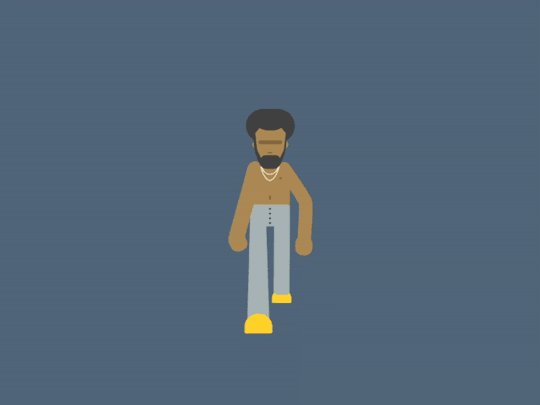
youtube
“Viral phenomena are objects or patterns that are able to replicate themselves or convert other objects into copies of themselves when these objects are exposed to them. They get their name from the way that viruses propagate” - spreads like an illness virus
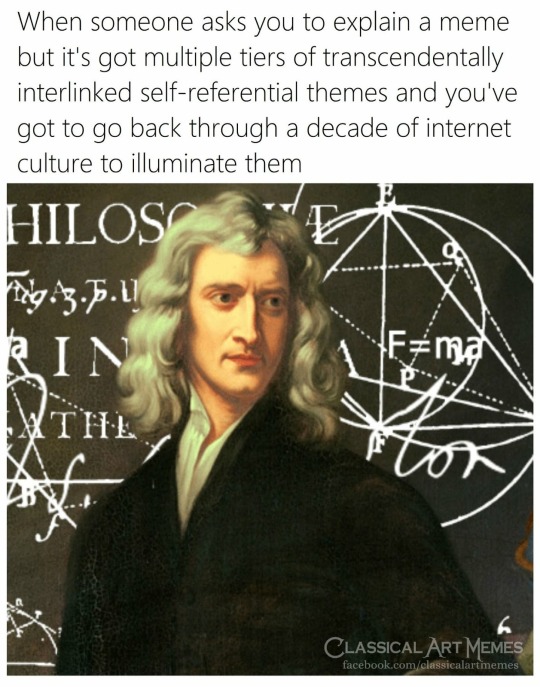
Meme that describes a meme - explaining their links to culture, etc - read intertextually
Meme culture needs to look back over years of culture to understand
Intertext - every text is talking through something
“The word meme was coined by Richard Dawkins in his 1976 book The Selfish Gene as an attempt to explain the way cultural information spreads; such as beliefs, fashions, stories, and phrases” - the meme about him creating the meme - in his books talks about how we are memes due to over genes copying themselves - how cultural information spreads “When you plant a fertile meme in my mind you literally parasitize my brain, turning it into a vehicle for the meme’s propagation in just the same way that a virus may parasitize the genetic mechanism of a host cell.” - we decide what a successful meme looks like
A virus population explodes by how many people it touches

Stanley Milgram - Conformity and Independence - if people were looking up in the street passers by looked up too - FOMO - memes are fomo - fear of missing out - we won't help until someone else steps out to help
As humans we follow order to not be the weird link in the group - always trying to survive - are we really individuals? Following the leader within the group - been proven by social experiments in people were people are put in situations and filmed what they would do
youtube
‘That's clickbait’ - part of meme culture - we click on link
Hashtags - ice bucket challenge - raising money for charity

#metoo movement - Tarana Burke launched me too movement - white washed out of the photograph
Tarana Burke: "We owe future generations nothing less than a world free of sexual violence," she says. "I believe we can build that world." - against sexual assault and harassment followed allegations from Harvey Weinstein
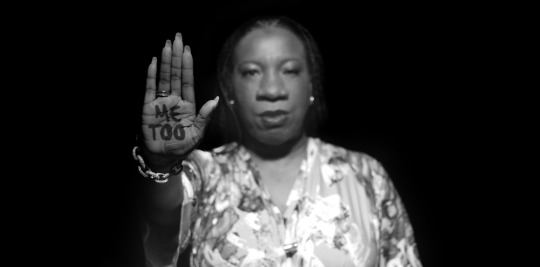
Great Thumberg image - cropped black women out of image that went out across the world - press said the image needed to be tightened - black young girls story is just as important but she got cropped out? Due to her race?
Racial violence went up after brexit.

Memes that reference themselves - intertext
Can do anything with a meme - take on mind of their own
‘Meme’ from 1920’s developed into modern day meme - copied and spread of variations of images


‘Lonelygirl15’ - video blog of her on YouTube - her life portrayed through videos was fiction
Donna Haraway: “the cyborg is a matter of fiction and lived experience”
A “fiction and a fact of the most crucial, political kind” - we are now cyborgs- links to use of technology and memes - written about years ago - we are them as we are so connected
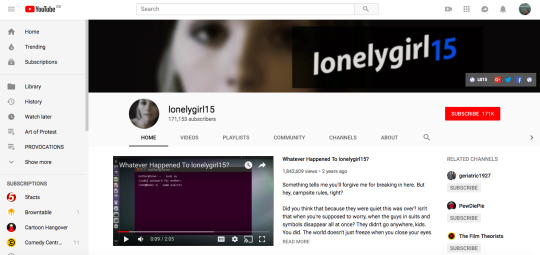
Donald Trump - Memes - reaction - people laughed at something that wasn’t meant to be funny - people of the free world laughed at him - next hour, next day memes of it came out

Blue and gold dress - was a marketing ploy
Banksy work shredded after brought fro record money - ‘going, going, gone’ - shredder built into the frame incase it ever sold at auction - sotherbys shocked by stunt
The next morning - different versions of shredded art appeared on Instagram
youtube


Game of Thrones - very dark - ‘grimdark’ fiction - we live through very dark fiction due to the world happening around us - e.g. The Wicther and The Alienist
Grimdark is being replaced by ‘hope punk’ e.g. star wars
Explore what it means to be good - look for good characters in film and tv
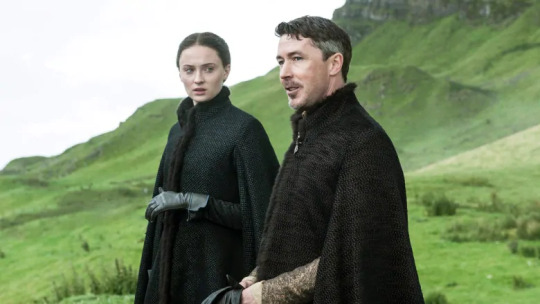

Set Task:
For the set task I decided to explore the role that photographers has in the Me Too Movement.

https://aperture.org/blog/fashion-photography-metoo-era/

https://www.huffingtonpost.co.uk/entry/photography-me-too-women-portraits_n_5acfa0ffe4b077c89ce68b22?ri18n=true&guce_referrer=aHR0cHM6Ly93d3cuZ29vZ2xlLmNvbS8&guce_referrer_sig=AQAAAL8hBrcNJnlzvM2G5iJo89bWhtItoVcfNQkqoYM08qJfDV5TI08ARgriyFvDBtvqbeBjOEfwAaBztNDTaQ6YPMfyRNNNzs1h8Kw6rfO9wgPQFIFIUEYd0kJKA7ihh_f9L_RHULvXPsvWHxAsg9oYHqHcGmd-Ss7tlt9vnpR9iKTb&guccounter=2
Seminar:
Viral phenomena applies to narrative and telling stories
Things go viral for many different reasons
Cultural studies is a way of trying to read how culture works
Books:
The Posthuman: N. Katherine Hayles How we become: virtual bodies in cybernetics, literature, and informatics
The Cyborg: Donna J, Haraway: A Cyborg Manifesto, 1984
How does this theme link back to previous lectures and seminars? It relates to the hauntology lecture with the idea of the end of history, stuck repeating the same things never coming to a conclusion. It also links to nostalgia with the past repeating itself within viral memes. Is creating memes and other viral phenomena a part of our collective utopia?
(Hills and Valleys- direct statement on federal government on women, birth control, family planning, controversial areas - depicts womens hips, vajazzle of government building ) The art of going viral | Niki Johnson - ted talk - gender, power and human rights, being clinically engaged is involved in her everyday life, one piece of work went viral twice - major world event at the same time the art was released, had zero experience with media the first time - way out of comfort zone, art in the media is based on its ability is its public interest, meaning becomes unruly, piece had cultural significance, second cycle was virtual and newspaper
For the seminar task our group choose to focus on the most recent Banksy that has appeared in Bristol and went viral due to his Instagram post.
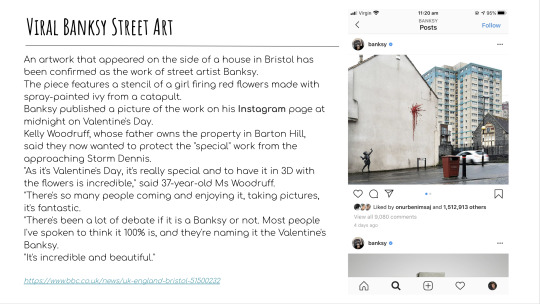
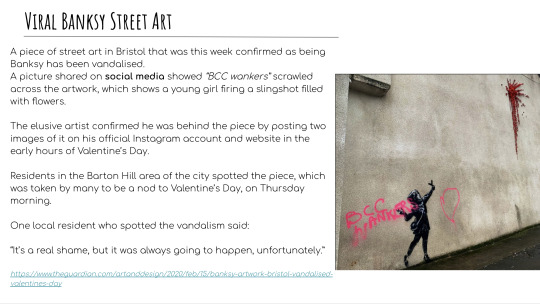
0 notes
Text
me, using mobile tumblr: it’s so weird that I have to get on browser to see people’s pages! Hey, wait…isn’t my dni also a page…?
my face:

So! Uh, here’s a post so mobile users can also see it!
Quick DNI guide:
Please don’t like, reblog, or follow if your blog is…
18+, p.orn, n.s.f.w, k.ink, or similar (including dd.lg/md.lb/cg.l/ab.dl blogs)
p.edo / m.ap connected in any way
an.ti focused
dis.course focused
pro self.harm, eat.ing dis.order, or similar
part of a community that has agere, agedre, or cglre in its dni, or if you don’t allow interaction with them
I will always try my best to keep negative content and harmful sources off my blog - that’s a promise! 🌟
If I mess up and I reblog from a possibly harmful source, or if I broke your dni, please let me know so I can remove the post.
All regressors and caregivers are welcome as long as your blog doesn’t match the above! 🙂
About me:
Age: 35 (born december 1983)
Nation: United States
Ethnicity: Black
Gender: Nonbinary
Orientation: Lesbian/Queer (grey-ace)
Regression age: 7 - 13 (pretty flexible tho!)
Likes: Books, video games, anime, baking, magical girls/boys/kiddos, writing fantasy, technology, the night sky, soft and cozy aesthetics, tabletop roleplaying, arts and crafts, rainbows, dragons, unicorns, robots, mermaids, sparkly stuff, late 80s/early 90s nostalgia, warm fluffy fanfic, using way too many words
Dislikes: Mushrooms, onions, crowded noisy places, sharing my bedroom, early mornings, concern trolling, bad faith arguments, pretty much anything being se.xuali.zed, grimdark/pessimistic fiction, gatekeeping, politics (it’s important but it’s hard), hardcore gaming (the community, not the content), microtransactions, brain-as-worst-enemy moments
I mostly regress for stress relief, as I don’t know of any trauma based reason to me to do so. It’s usually voluntary but not always, and tends to be ‘shallow’ - I shift states pretty easily.
I also consider myself an age dreamer, as the line between “regressed in my head but not outwardly” and “doing what I would do to regress but not actually there yet” can be fuzzy. (and that’s without counting the days where I don’t feel regressed until something happens to make me wonder if I had been big at all that day…)
I go through periods of being all “look at (thing)! It’s so cool! I’m gonna post about (thing)!” and then cooling down and forgetting about (thing) to go on to (stuff) and having the cycle repeat. I apologize in advance if my queue is all (stuff) after weeks of (thing) content! I come back to my favorites, it just takes a while.
0 notes
Text
Dear Worldbuilder!
This is just a general thing to tell you what I like/don’t like. I’ll be super thrilled if you find something adjacent you want to make instead! Most of my prompts are for writing, but art is also very welcome.
For all my requests there’s a potential to set them in canon, but also pre-canon or post-canon, and I don’t have a preference.
Likes:
competence porn
people not realizing they’re the most competent at their job/hobby
people failing their way to success
epistolary, journal entries, encyclopaedia entries, textbook articles
outsider POV
people not usually found in law enforcement solving crimes
dragons, fairy tales, magical realism
I kind of don’t dare to put politics here after what has happened and is happening right now, but I love the kind of pragmatic politics with idealistic background, and I’m a sucker for idealistic pragmatism, but I would totally understand not touching that with a pitchfork.
moral conflicts, orange and blue morality
people coming together to solve problems
noodle incidents
convoluted backstories you wouldn’t expect
Dislikes/DNW:
grimdark endings
rape, especially rape as backstory
hopeless, crapsack worlds
melodrama (stuff that takes itself too serious)
sex in a library
Leverage
This perfect show hits all of my weak spots and I may or may not have rewatched it more than ten times. Do not worry about getting facts wrong, though -- my memory is a sieve.
My favourite character is Jim Sterling. There is absolutely no need for including him in your story. I focused less on the requested characters and more on the worldbuilding prompts, but if you rather want to focus on any of the other characters, I love each of them on their own, too! (And together! And I love that Sterling is so eminently hateable.)
Characters: Jim Sterling, Alec Hardison, Eliot Spencer, Parker, Sophie Deveraux
Prompts:
WB: Aliases and their imaginary lives
It is known that one of Parker’s aliases had to go do jury duty. Are all of the aliases Hardison creates registered to vote? Do they get parking tickets? Do they all have jobs? How deep does this go?! Do they have housing, are they paying taxes -- do they have student debt?
Is Hardison creating aliases as some sort of cathartic response -- does he do it for fun? Does he ship them with each other? (Is he secretly a writer...)
WB: Interpol
RL Interpol doesn’t have field agents, does Leverage Interpol have agents, or is Jim Sterling just overly awesome at pretending to be an upstanding citizen?
If it is in fact, a real criminal enforcement agency, what are some of his reports like? Maybe he actually isn’t there to investigate Leverage Consulting, but is instead taking down the politicians they are after?
Is Interpol’s relationship with the Leverage team sort of a running joke in the intelligence community? Or like, the go-to-excuse for derailing an operation?
WB: Criminal Files
Oh man, I would love to peak into what kind of criminal files the various characters have (if they even have one), on different criminal databases
Maybe Parker’s fingerprints are at so many crime sights at once, people think the finger print is a statistical error
WB: RPF fanfiction in-universe
That weird thief in “A Girl’s Night Out” is definitely a Parker stan, and stalks all her crimes across a variety of message boards.
Lots of fans start out with just one of them; Parker, Hardison and Sophie are kind of infamous, and they probably had a following before teaming up, but it really starts getting intense when there are rumours of them working together (!!) to take down even worse criminals (!!) That’s when Hardison organises the first con
There are probably volunteers for identity theft
(oh god. ship wars.)
tumblr-sites dedicated to finding out if what Parker can do is actually humanly possible
the desperate hunt to find out which WoW avatar Hardison is playing
in-universe fanfiction, in-universe meta, chat-streams, twitter messages
WB: Contacts of Leverage Consulting
How do they find clients?
Do they get clients via submission based websites? How do they check their information?
Queen’s Thief
My prompts focus more on pre-, or during canon time periods, but if you want to play in the future, that’s also great!
Characters: Original Pirate Character, Original Female Characters, Original Thief Character, Eugenides the God
Prompts:
WB: Diplomatic Relations
There is probably trade happening outside the for main countries. How does that happen? Is Ornon part of a larger battalion of cousin-diplomats? Do they speak different languages, or dialects? Where there misunderstandings based on changed language?
Where is the University of Ferria and why can Eugenides send someone there for exile? Are there other places people can be send to because of political turmoil?
Are any of them send back because they had been exiled by different kings?
How do the other countries react to the Sophos method of negotiation?
Or the fact that the Sovereign of Attolia, Eddis and Sounis is a Thief/Eugenides?
WB: Island States
How do the Island States keep their independence from both Sounis, Attolia, and the Mede for so long?
The answer might definitely be: Pirates. How does it work? Is it like a law-free zone, or do they have strict policies in place? Do they buy their lumber for the boats from Eddis, like all the rest of the countries? Or does their entire fleet contain ships other people built.
What makes them different from Attolia, Eddis, or Sounis? Is there a difference? (Ocean traditions, gods, system of government)
WB: Engineers
Who built all the passageways through Eddis? Are there lifts working with water displacement?
How about those clocks. How does a vaguely Byzantine Empire get clocks. Or guns.
Where do they go to study? Is there an engineering section in Eugenides’ library in Eddis? Who do they read? What kind of subject do they fail -- Euclidean algebra?
WB: University of Ferria
Does it have a library?
How about the History Department. Do they have questions about the change in power re:Attolia? Is Erondite the Younger helpful?
What’s the relationship to the country Attolia?
Do all the children of the higher echelons go to university?
WB: myths
How do normal thieves interact with their god? Maybe Eugenides isn’t such an aberration, and Eugenides the God comes to all his thieves and tells them to stop whining, or iterations thereof.
What’s up with that falling stuff? Myth, or myth busted? Did the Queen Thief really fall of dancing on a roof, or did she intentionally kill herself?
How did Eugenides become the god of thieves? Is he just responsible for thieves, or also for other things?
Discworld
Look, I obviously have a soft spot for competent despots. Also, I find it a shame that Susan Sto Helit, Sam Vimes and Lord Vetinari never met in canon, because they are all sort of nobility. Any of these characters would be great! So would different characters.
Characters: Lord Vetinari, Susan Sto Helit, Sam Vimes, Rufus Drumknot, Original Characters
Prompts:
WB: Patrician’s Palace
I would love to see how the architecture looks like, anywhere among at least six floors, plus cellars, sub-cellars, and liveable attics. Floorplans! Secret tunnels! Who all lives here? Is there a visitor’s log?
We know there’s no orang utans in the menagerie, but what lives there?
How about those dungeons? The cells look from the inside, there’s a pit Reacher Gilt fell into, and Moist von Lipwig obviously didn’t -- are there more ways towards “escape”? Where are all the secret tunnels?
The gardens were designed by “Bloody Stupid” Johnson. Anything else he made better?
What about the axe Sam Vimes buried in the middle of the table in one of the palace chambers? It’s still there as a conversation piece. What kind of conversations happen around it? Is there a feature about it in the newspaper? Does it start a trend in interior decorating?
WB: Children’s Literature
Susan Sto Helit likes to edit fairytales. Does she ever publish a revised edition? In the first edition of Grimm’s fairytale there is a story called “How Some Children Played at Slaughtering” and it’s exactly what you would expect. Does Susan tell this story? Does she get protesting parents, and how does she deal with them?
There are some children’s books with barely changed villains based on real politicians. Is there one with Lord Vetinari featuring as the bad guy (or maybe the hero)?
How about “Where’s my cow?” -- does the story change when Sam’s son grows older? It got reviewed by the Ankh-Morpork Times -- does the newspaper have a regular children’s literature page? Is the version Sam Vimes tells his son the one that Rob Anybody reads in the chalk? Does that book have a fan community (what would that even look like?)
WB: Newspaper Articles
Page Six -- Ankh-Morpork style: Do they report on what kind of beer upstanding citizens drink? Is there a column for where Sam Vimes is expected to be today?
It’s not technically a newspaper, but Twurp’s peerage lists nobility without judgement, and I would love to read an entry for any of the people nominated.
Does the Times report on itself sometimes? What about reporting on the new tax system? Do they ever have to deal with computers and the Internet?
Are there other newspapers? Do they report about the same events differently? Are there opinion pieces from weird people? Do they get letters to the editor?
Obituaries: Is there an upcoming deaths section for wizards and witches? Do they invite people to their death celebrations? How do they deal with the Undead?
Rivers of London
This book series is so rich with details, and it’s amazing. If there’s any of my ideas you absolutely disagree with, feel free to ignore them and focus on something else instead!
Characters: No characters, Original Characters
Prompts:
WB: The White Library (Rivers of London)
Bibliotheca Alba
I’m not really sold on the location of Meckenheim. Convince me? To explain: Peter and the Professor talk about it being in the city of Cologne (the capital city back then) until the French invaded, then moved it to Weimar (the capital city of the Weimar Republic and also the Third Reich), upon which it was moved to Bonn (the capital of West Germany). That is utterly ridiculous. Weimar was under occupation by the Russians at that time, and like hell they would have given up that kind of power, and the capital city of people’s mind remained in Berlin. Bonn was a rather puny city, and only became the capital because Konrad Adenauer (the first head of state) happened to be born there. There is a library housing every work in german language published since 1918, and it’s split into two locations: one in Frankfurt am Main, the other in Leipzig. But maybe it’s different for the magical part? Still, who in his right mind would want to have a magical library in Bonn? Nobody, that’s who. Also, a strong contender for where a magical library could be housed: Bielefeld, the city that doesn’t exist
this leads me quite nicely to, how did they move a large amount of magical books from Weimar to Meckenheim during the post-war confusion? were other magical being involved?
also would love a library catalogue, how a magical library looks, a non-human librarian
WB: the London Underground
Is the Underground sentient, and if so does it eat other things besides people?
What kind of traditions, stories do the pale people have? are they human? do they know?
WB: Magical Trade
I’m sure there’s plenty of clothing and accessories needed to ensure the masquerade works, and the magical population isn’t outed as such. Where do they go buy clothes? Is there advertisement?
Did the Folly police magical markets, back when there were more of them? Are there anti-fraud spells, or artefacts? If the Folly didn’t regulate this kind of stuff who did/does?
Do people trade with the fae? How does that work - does it ever work out in favour of the human?
Do the Rivers sometimes trade on their territory?
WB: Demi Monde
what other strange people are there? What about genii locorum of bridges, streets, buildings
do places with a lot of magic gain sentience? How about the Folly? Skygarden?
there are hedge wizards, what about hedge witches? are there sirens? People who see the future? what about that marketplace where Zach Palmer was found, are all of them magical? how do they blend in? (Do they blend in?)
Are there like, Werewolves of London? (around in Chinatown, hungering for some chinese food)
What about magical tourists. Do they get a pamphlet on where to find like-minded people? Is there a magical tourism bureau, staffed by idk, the River Crane?
2 notes
·
View notes
Text
Best of 2017
This was almost a weak year for anime, but then the Fall season happened. Apparently anime was just saving all their best for last in 2017.
10: Seikai Suru Kado ∥ Toei Animation �� Dir. Watanabe Masaki: This may be a surprise inclusion, given that Kado was admittedly one of the most hideous-looking shows of the year, but in a post-Kemono Friends world, anything is possible. Looks aside, Kado does the remarkable thing of giving us actual science fiction in an anime: you know, cerebral, philosophical, and trying to raise questions about our own society through the lens of the fantastic. It definitely has flaws, but there aren't many anime I've watched that feel as much like a good SF novel as this one does.
9: NEW GAME!! ∥ Douga Koubou ∥ Dir. Fujiwara Yoshiyuki: Here's a more conventional choice. You know I love Zoi-chan, and her second season was everything it should have been. We have the great character development of Aoba coming into her own as a designer, Nenecchi being the world's most adorable beginning programmer, and a genuinely moving ending with Kou-chan setting out on her own. Plus it adds some adorable new girls, and the cuteness delivered by Douga Koubros is on point as always. Wako-chan dabes!
8: Gabriel Dropout ∥ Douga Koubou ∥ Dir. Oota Masahiko: You didn't think the Comedy God wouldn't find his way on here, did you? Oota Masahiko had a two year absence from my Best of the Year lists, but now he clocks in for the fourth time with the eminently enjoyable Gabriel Dropout. As you might expect, this show has a feel similar to the original Yuruyuri: it's super comfy, but also hilarious. Comic foil Satanya was easily one of the best girls of the year.
7: Little Witch Academia ∥ TRIGGER ∥ Dir. Yoshinari You: Some will probably think I have LWA a little low... It's definitely a masterpiece of design and, at times, animation, but I felt like the overall plot dragged a little. Some individual episodes were brilliant, though, like the one where Akko travels inside Sucy's brain, the labor strike episode which gave us glorious Comrade Akko, or the robot episode aka Gurren Lagann 2. The big plot about the kotonoha and the evil Elon Musk, on the other hand, I never really got that invested into, although Shiny Chariot is definitely a babe. Still, it's got all those great themes about believing in yourself that are so genuine and earnest that you can't help but love it.
6: Shuumatsu Nani Shitemasuka? Isogashii Desuka? Sukutte Moratte Iidesuka? ∥ C2C/Satelight ∥ Dir. Wada Junichi: I'm totally biased towards this series, having read the books, but I do think it's a really good anime in its own right. Kutori's tragic story is told with the utmost care and even though they only adapted three of the five novels it still turns out as a complete and satisfying story unto itself. The feels are all over, especially thanks in no small part to a beautiful score (including several vocal pieces) by Katou Tatsuya that really ties the show together tonally. I'd really kill for a second season.
5: Youjo Senki ∥ Nut ∥ Dir. Uemura Yutaka: So, I almost feel guilty putting this show on here because it's definitely the hardest anime I've ever watched raw (Monogatari shows included) and I still feel like some of it may have gone over my head. But even my dumb ass knows enough to tell this is one of the smartest shows of the year, a study of man's tendency towards war as seen through the eyes of a little girl who embodies the doctrine of "the ends justify the means." Yuuki Aoi turns in probably the best performance of her career as Tanya who is definitely one of the most memorable characters of the year, even if Nazis think she's supposed to be a "badass" you're meant to root for. This is another one that desperately needs a second season.
4: Kino no Tabi -the Beautiful World- the Animated Series ∥ Lerche ∥ Dir. Taguchi Tomohisa: I always heard the original Kino was great but I didn't care enough to actually go back and watch it. Thankfully, anime's got me covered with this new adaptation that definitely lived up to the hype. If I were to use one phrase to describe Kino no Tabi it would be "Star Trek"―much like that show it's an episodic series about some people on a journey to strange places that uses each episode to set up an ethical or philosophical question and then work through it. As a result, it's wonderfully varied and constantly surprising. Also, Kino is cute!
3: Konohana Kitan ∥ Lerche ∥ Dir. Okamoto Hideki: Is it wrong for me to say this show is like Kino? Konohana is also a series of short stories tied together by the setting and characters of the inn, but instead of setting up philosophical questions it's all about sentimentality. I really appreciate short form storytelling and there are a ton of fantastically constructed short stories here and they rarely failed to make me bawl my eyes out. It also features some of the cutest girls of the year, to the point that I still don't really know who best girl is: I gave it to Yuzu, but you really couldn't go wrong with any of them.
2: Houseki no Kuni ∥ Orange ∥ Dir. Kyougoku Takahiko: It's a real shame that this show can't also be anime of the year, but second place is no indictment of the quality of this show which was one of two to earn a perfect score last year. Houseki no Kuni is a standard (if masterfully executed) bildungsroman, but it's wrapped in a package unlike anything I've ever experienced before. The arresting character designs are the first thing that jump out, but there's also the unique and never-quite-explained setting and world, including the haunting visuals of the moon people antagonists, and the show's stylish fusion of 3DCG technology with traditional animation techniques, resulting in some of the best cinematography of the year. And then there's the cast of characters, headed by Kurosawa Tomoyo as Phosphophyllite who has with this performance removed any doubt in my mind that she's one of the top actresses in anime right now. Phos experiences character growth that's almost unprecendented in this medium, where return to the status quo is the norm for most "arcs," and Kurosawa's performance which takes Phos from goofy red-headed stepchild to cold, disaffected warrior (while still not losing any of her personality) really ties it all together. Phos's character development is so satisfying that it even manages to convincingly take the place of a real ending to the plot. A genuine masterpiece.
1: Shoujo Shuumatsu Ryokou ∥ White Fox ∥ Dir. Ozaki Takaharu: But as fate would have it there would be two unqualified masterpieces this year... Part of the reason I've put off finishing this post is because I've struggled to think of ways to communicate how truly sublime the experience of watching Shoujo Shuumatsu Ryokou is. It's beautiful, thoughtful, introspective, sentimental, heart-rending, soothing... I guess it's fitting that it's so many things because the show is ultimately about humanity, where we came from, and where we're heading. And it does all that without being brooding or melancholic: these round girls look the apocalypse square in the face and still manage to find beauty, comfort, and profound meaning in the world. If that isn't humanity at its purest, what is? This show that is at first glance about two round blobs on a road trip will make you reconsider mankind's place in the universe. I love anime.
Close but no cigar:
The biggest conflict for me was Princess Principal, which I really wanted to include in the list but just couldn't make room for it. There's a lot of things I love that show for: its fun setting, endearing characters, its well-told short form stories, and the fact that it tiptoes into dealing with leftist politics... But unfortunately it ends quite poorly, which is a big knock on a show as plot-driven as this one. In a similar vein, Kakegurui was one of the most compelling shows week-to-week of the year, but it also suffers from a weak non-ending which lets a little air out of the balloon after all the super hype gambles until that point.
In the cute girls department, there was Kobayashi-sanchi no Maidragon, which let us know that Kyoani can still make moe anime if they try. It was definitely a great specimen in the genre, but it didn't really do anything special enough to get into the top ten... other than having Kanna. There was also Eromanga-Sensei, which lived up to its name by being very ero but was also just unremarkably good.
In terms of lesser shows that deserve a shoutout, I've gotta give one to the second season of Lovelive! Sunshine!! for being so incredibly better than the first outing that it made me genuinely love Aqours and look forward to the upcoming movie. After the last two season of Lovelive anime I never thought I'd really care again, but they managed to do it with a renewed focus on character and abandoning the stupid 'save the school' narrative that made Sunshine feel like a second-rate knockoff of the original. I should also mention Made In Abyss, if only because of its overriding popularity around the world, but also because the first half of it was setting up for an all-time great show that could have easily slotted in among Houseki no Kuni and Shoujo Shuumatsu Ryokou, but then it made the mistake of getting too grimdark and ruined it.
Now time to open the envelopes:
Best Actress: Kurosawa Tomoyo as Phosphophyllite, Houseki no Kuni. What, you were expecting someone else? At only 21 years of age Kurosawa has already established herself as a force to be reckoned with, between this role and her similarly fantastic work as Kumiko in the Euphonium series. She brings a level of emotional texture to a character that's seldom seen in anime. Just go look at the review for Houseki for more explanation of why she deserves this. We definitely have a lot to look forward to with this girl.
(Honorable mentions: Yuuki Aoi as Tanya Degurechaff, Youjo Senki; Noto Mamiko as Morioka Moriko, Netojuu no Susume; Minase Inori & Kubo Yurika as Chito & Yuri, Shoujo Shuumatsu Ryokou; Hayami Saori as Jabami Yumeko, Kakegurui)
Best Actors: Ichikawa Aoi & Murata Taishi as Izumi Eita & Souma Haruto, Just Because!. I didn't include Just Because in the close-but-no-cigar section because I figured I could give it credit here. For me, Just Because! was one of the most underrated shows of last year; it won me over with its understated but earnest depiction of youth navigating the tangle of falling in love for the first time. Part of what makes it so charming is the realistic relationship between Ichikawa and Murata's characters, once-seperated friends who reunite when the protagonist moves back to the town he grew up in. The interplay between the characters has that sort of unstated intimacy that often defines male friendships, and while a lot of that is down to the solid writing, it's hard not to give credit to the actors for making the characters' relationship so darling as well.
(Honorable mentions: Fukushima Jun as Satou Kazuma, Kono Subarashii Sekai ni Shukufuku wo! 2; Chiba Shouya as Azumi Koutarou, Tsuki ga Kirei; Saitou Souma as Glenn Radars, Roku de Nashi Majutsu Kyoushi no Akashic Records)
Newcomer Seiyuu of the Year: Tomita Miyu. Talk about jumping onto the scene. Tomita first came to my active attention with her role as the aloof angel Gabriel in Gabriel Dropout, and her comic delivery was a big part of that show's success. When she later played Kuina in Hinako Note, I thought maybe she was a little one note, because the performances seemed really similar. Her performance as Riko in Made In Abyss, though, really threw her into the spotlight. While I personally hated what happened in episode 10 from a narrative standpoint, there's no denying that that scene was so gutwrenching and affecting for so many people because of Tomita's performance. I'd still like to see if she has more vocal range, but even if she doesn't, this girl―who was only seventeen years old while turning in that work!―can definitely act. I hope we get to hear her lead another show sometime soon.
(Honorable mention: Naganawa Maria. It's not always the case that a voice can entirely make a character. People like Kugimiya Rie can do that, and in recent years Sakura Ayane does the same for me. Naganawa Maria as Kanna Kamui in Kobayashi-sanchi no Maidragon is another example. Kanna would have always been cute, of course, but it's Naganawa's voice that really put her over the edge to becoming one of the most widely popular characters of 2017. The quality of her loligoe is uncontested, but what remains to be seen is if she can truly carry a show as the main protagonist. The only example we have of that is her work as Honda Tamaki in Stella no Mahou, which I enjoyed, but I'd like to hear more of her in that kind of role.)
0 notes
Text
A Hopepunk Guide: Interview with Alexandra Rowland
https://ift.tt/2NNmRO5
We talked to author Alexandra Rowland about hopepunk, a term she coined in 2017.
facebook
twitter
tumblr
This interview with Alexandra Rowland was part of my research for "Are You Afraid of the Darkness: A Guide to Hopepunk," a feature written for Den of Geek's New York Comic Con print magazine that delved into the hopepunk term, first coined by Rowland in 2017. I recommend beginning with that article before diving into this full interview transcript.
Den of Geek: What is your current definition of hopepunk?
Alexandra Rowland: Well, there's the glib answer: “Hopepunk is the opposite of grimdark”, and there's the more nuanced answer: Hopepunk is a subgenre and a philosophy that “says that kindness and softness doesn’t equal weakness, and that in this world of brutal cynicism and nihilism, being kind is a political act. An act of rebellion.” (from my essay,“One Atom of Justice, One Molecule of Mercy, and the Empire of Unsheathed Knives,” which is the closest thing that I've written to a hopepunk manifesto.) Whichever you choose, it's important to remember that punk is the operative half of the word – punk in the sense of anti-authoritarianism and punching back against oppression.
Has that definition of “hopepunk” changed since you first coined it in 2017?
Yes and no. The heart of it hasn't changed at all, but my efforts to remind people of the angry part of hopepunk definitely have grown. The instinct is to make it only about softness and kindness, because those are what we're most hungry for. We all want to be treated gently. But sometimes the kindest thing you can do for someone is to stand up to a bully on their behalf, and that takes guts and rage.
Do you consider hopepunk a genre or something else?
I mostly talk about it in the sense of a subgenre, yes – similar to how we use the words grimdark or cyberpunk. But it's important to remember that the sorts of stories that we tell (and how we tell them) reflect our values and perspectives on the world, or at least a value or perspective that we're striving to understand in some way.
By telling hopepunk stories, we necessarily have to be asking questions like, “How do we care about each other in a world which so aggressively doesn't care about so many of the people in our communities? Who do we consider community, and is that definition too narrow? How do we fight back against the people who want to make us sit down and shut up?”
By asking ourselves these questions, hopepunk expands from simple “genre” to an entire life philosophy. It sticks in the back of your head and changes you, a little bit.
What are your favorite examples of hopepunk?
Sense8, Meg Elison's The Book of the Unnamed Midwife, the Russian movie Stilyagi – these are all amazing (and sometimes difficult and emotional) works. But as far as I'm concerned, the face of hopepunk is Sam Vimes, a character from the Discworld series by Terry Pratchett. He's a gritty, hardened cop who is introduced when he’s lying blind-drunk in a ditch. He's tired, he's flawed, he's jaded and cynical... And yet he still, right at the basement foundations of his heart, believes in something. He gets out of the ditch, sobers up, gets his life in order. He holds onto his principles with a white-knuckled grip because he knows how easily they could slip away from him. He knows how easy and comfortable it would be to let himself become corrupted by his cynicism. But he stands up, sometimes against whole armies, and refuses to budge from what he knows is right and just. He is the very embodiment of: “No, you move.” And they do. The whole world does.
How intentional was that initial post? Was “hopepunk” something you had spent a lot of time thinking about before you wrote that initial Tumblr post?
Hah, the first Tumblr post was just that glib line “Hopepunk is the opposite of grimdark” and it was entirely off-the-cuff. It wasn't until a few hours later, when people were reblogging it and saying, “Wait, I think there's something here and I think I understand it instinctively, but can you explain so I can be sure?” that I started actually examining what I meant and discovered that oh, actually, yeah, this is important and it's something that I care about deeply.
I have seen some criticism, generally, of the overuse of the word “punk” as a suffix. Do you ever wish you had used a different word? Were there other words/phrases you considered?
We think that “punk” as a suffix has been overused because many of the recent genres that have invoked it did so for aesthetics (ie: to reference “cyberpunk”, the first instance of the compound), rather than because it meant something, and that’s annoying. Cyberpunk is punk. Steampunk is not – in fact, steampunk often reinforces the imperialist, colonialist narrative and ideals, which is the opposite of punk.
I have never wished I used a different word. The purpose of language is to communicate meaning clearly, and “hopepunk” seems to have carried its own meaning with delightful efficiency.
Do you think there’s something specific to Tumblr as a social platform that allowed hopepunk as a vibe to flourish?
I think that the very format of Tumblr was part of it – while Tumblr is terrible for having an actual conversation with someone, there's one thing it's really good for: you can write an essay as long as you want and then people can share it effortlessly. With Livejournal and Dreamwidth, you could do the former, but not the latter. With Twitter, you can do the latter, but the former is tedious in the extreme. That said, hopepunk didn't stay on Tumblr very long. People were crossposting screenshots of the post to Facebook and Twitter within the first 48 hours.
I think that hopepunk as a vibe flourished simply because it was the summer of 2017. We had a new president and the world was terrible and frightening. We didn't know what was going to happen, and whether it was too late to change anything, and so many of us were looking around for... something. Guidance, or comfort, or a promise that Good would eventually triumph, or ways that we could make a difference and heal the world. We were starving for stories that would tell us how and why to resist. I didn't invent the vibe – the vibe was already there and already burning. All I did was name it.
Were you surprised by the amount of attention this Tumblr post and hopepunk as an idea has gotten?
Initially, I was just vaguely bemused that anyone was listening to me, but at the same time I understood intellectually why hopepunk was resonating with people. Simply put: they were hurting, and hopepunk was a thing that helped comfort the hurt. In hindsight, I'm just very happy – when so many people find a philosophy like hopepunk meaningful and compelling... it sorta restores a bit of your faith in humanity, doesn't it? Maybe all is not yet lost, if there are enough people around to say, “Oh. Yes, this.”
Why do you think there is a need for an idea like hopepunk right now? Do you think culture is becoming more or less hopepunk?
There is a need for hopepunk because our president is a fascist. Because there are children dying in concentration camps within our borders. Because Jeff Bezos makes nearly nine million dollars per hour while his warehouse employees risk homelessness. Because we think it's normal that people should go bankrupt if they get ill and need medical assistance, or that they should get an Uber to the hospital instead of an ambulance. Because climate change is real. Because children have safety drills to practice what to do in case of an armed shooter in their school. Because racism, sexism, homophobia, transphobia, and ableism exist. And there is a need for hopepunk because it reminds us that these dragons can be slain. Because it reminds us that there's power in a union, that communties banding together can make a difference. Because the moral arc of the universe bends towards justice. We've beaten them before, and we can beat them again, and the next time after that. The work is never finished, and the fight is never permanently won. But we keep fighting anyway, because it is the fight itself, not “winning”, that’s the point.
As to whether we're growing more or less hopepunk... It is easy to embrace despair and to think that the world is unrelentingly terrible, but at the end of the day, we're all just human. As individual humans, we haven't appreciably changed in tens of thousands of years. We still struggle with personal flaws and failings, we're still rude and inconsiderate and selfish, and we're still all making the same mistakes that our ancestors were making hundreds and thousands of years ago. And yet, as a society, we haven't managed to kill each other off yet, and we do keep striving relentlessly towards something better.
Do you think of hopepunk as a reactive idea? Does it have to be in relation to grimdark/noblebright or is it something bigger than that?
I think that all genres are reactive -- the purpose of storytelling is to show us possibility, and authors, since they are humans living in the world (sounds fake, I know), naturally react to the social context around them. Trends in horror movies, for example, reflect the shared cultural fears that we face. In the wake of WWII, the horror genre was fixated on the monstrous side effects of radiation. In the wake of 9/11, we got a spate of horror movies about airplanes.
Grimdark and hopepunk are reactive to two opposite social contexts -- they are the man standing at Julius Caesar’s shoulder as he rides his chariot through the cheering crowds, whispering to the emperor: “This too shall pass.” In some contexts, it is a warning (grimdark). In others, a comfort (hopepunk).
You are involved in lots of fandom spaces. (Love your Good Omens fanvids! Thank you for your service!) Do you think transformative fanworks tend to be more hopepunk than mainstream works or curatorial fandom?
Oh absolutely. I think of transformative fanworks as Marxist creativity. It is a group of people literally seizing the means of production and making the canon anew in their own image, often because so many of us haven’t seen ourselves reflected in mainstream media. Also I just have big feelings about Art being an ongoing conversation, and how Fan Art is a valid and legitimate part of the conversation and that it deserves to be acknowledged and honored. (And on that note, thank you for the lovely compliment!)
Tell me about Choir of Lies. Would you consider it hopepunk?
A Choir of Lies is the standalone sequel (meaning they’re a thematic pair but you can read them in either order) to my debut fantasy novel from last year, A Conspiracy of Truths. They are about fake news and the power of stories, and Choir specifically is about fantasy tulip mania, grief, recovery from trauma, and how we use stories to heal ourselves. It was deliberately and explicitly written with hopepunk in mind -- problems are solved by communities rather than by heroic individuals, and sometimes the most important and meaningful thing that you can do is to make a small and simple gesture of kindness, something on the scale of holding out a hand to help someone who’s tripped. Small, yes, but important -- and to the person who is receiving the gesture, it might change everything.
More generally, do you intentionally try to write hopepunk stories?
In general, yes, I do tend to. I write about characters being emotionally vulnerable with each other and relying on communties and networks of support, and characters who knowingly engage with systems of power and oppression. I write about ways to solve problems that don’t involve violence. I write about ethics and what we owe to each other. I write about basically good people being flawed and messy and broken, and about basically awful people having complicated moments of shining grace and humanity. I write about characters who are smart and who think about themselves and their impact on the world, and who wonder out loud how they can do better. I write about characters who care, ferociously, about other people.
What else are you working on right now?
Ongoing projects include my two podcasts: Worldbuilding for Masochists and Be The Serpent (the latter of which was nominated for a Hugo Award this year!). I’m always writing something or other, but nothing that I can talk about publicly yet in any detail, beyond that they’re book-shaped things.
Kayti Burt is a staff editor covering books, TV, movies, and fan culture at Den of Geek. Read more of her work here or follow her on Twitter @kaytiburt.
Read and download the Den of Geek NYCC 2019 Special Edition Magazine right here!
facebook
twitter
tumblr

Interview
Culture
Kayti Burt
Nov 6, 2019
NYCC
NYCC 2019
from Books https://ift.tt/2pQD39k
0 notes